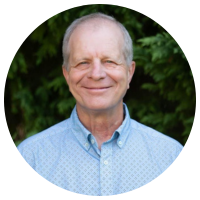As part of the Center for Child and Family Policy's 25th Anniversary celebration, we are honoring faculty, researchers, and staff who have contributed to the Center's work, culture, and impact.
Kenneth Dodge, founding and past director of the Center, is the William McDougall Distinguished Professor of Public Policy Studies at the Sanford School of Public Policy.
Read on to learn more about his founding vision for the Center, his research, and the books he keeps returning to.
What inspired you to initially found the Center for Child & Family Policy?
In the 1990s, faculty members across campus who study child development wanted to collaborate to translate their science into public policy. Leading faculty members included Phil Cook, Vonnie McLoyd, John Coie, Helen Ladd, Bob Thompson, and Phil Costanzo. They convinced the university administration to support a new Center. The first step was to hire a Director. I was at Vanderbilt University at the time and leaped at the opportunity to return to Duke in this capacity.
What are you most proud of from the last 25 years?
I am most proud of supporting the career development of dozens of bright young scholars who launched their careers at the Center. They are an outstanding group.
What’s something people might not know about you?
I captained my high school basketball team.
How is being part of the Center unique compared to your experience at other institutions?
I think of two ways. First, the Center has been entrepreneurial in pursuing unusual grants and projects. For example, we started an “evaluation clinic” in which we contracted with foundations to evaluate their intervention programs, thus giving us extensive experience in evaluation methods as well as an opportunity to generate funds to support our research scientists. As another example, we created the North Carolina Education Research Data Center, which houses all the education records of public school children born in the State since 1989, and we contract with researchers to create data sets for them. We have always been in need of stable funding, and the clinic and data center were ways to address that challenge while making a substantive contribution. Second, the Center has tried to be transformational rather than incremental. For example, we took on the goal of discovering how to reduce the population rate of child abuse in communities, not just to have an impact on a small number of participating families but rather the whole population. As another example, we are trying to create a new idea called primary care for families.
What’s one way you’ve seen your research impact policy at a local, state, or federal level?
Sunny Ladd, Clara Muschkin, and I evaluated North Carolina’s signature early childhood education programs, Smart Start and NC Pre-Kindergarten. Using fairly rigorous methods, we showed that state funding for each program led to sizeable gains in student outcomes, including higher standardized test scores and reduced grade retention. We testified to the North Carolina Legislature at a time it was considering possible cutbacks. Our findings made a difference in saving, even expanding, these valuable programs. As another example, we created and tested a universal program called Family Connects to support families. The program is now being implemented in over 40 communities across the nation.
What’s something people might not know about the Center that you would want people to know?
We generate a profit for the university.
If you had to choose just one, what is a takeaway from your research that you would want to share?
Surrounding parents of newborns with social and material support makes them feel less lonely, improves their parenting, and lowers the population rate of child abuse.
What’s one of your favorite stories or memories from your years at CCFP?
Easily the best decision I ever made was to hire Barbara Pollock as the Center’s first administrator. Even before I arrived on campus, I interviewed her from long distance and hired her right away without interviewing anyone else. I just knew what a gem she was.
How has the Center changed during your time here?
The Center has become more integral to the Sanford School. We administer an undergraduate Certificate Program in Child and Family Policy. We sponsor the North Carolina Education Research Data Center, which has been used by our students in over 50 doctoral dissertations.
What is your favorite children’s book?
Tell Me Again About the Night I Was Born.
Are there any books that you continue to return to?
Robert A. Heinlein’s Stranger in a Strange Land and the concept of grok
Paul Prudhomme's Louisiana Kitchen and BBQ shrimp
Thomas Kuhn’s Structure of Scientific Revolutions and the goal I pursue
What do you like to do in your free time?
Attend college sporting events.
What’s one of your favorite local restaurants?
Wooden Nickel in Hillsborough.
What was your favorite game as a child?
Anything with my Dad. We played a game we made up called, “Diver Outers.” My Dad would throw a football just out of my reach, and I would dive as far as I could to try to catch it.
Do you own any pets?
Three cats, three horses, and three mini-donkeys.
The 2024-2025 academic year marks the 25th anniversary of the Center for Child and Family Policy (CCFP) at Duke University. In celebrating this significant milestone, we are shining a light on individuals who have been instrumental in shaping the legacy of CCFP. In these 25th Anniversary Spotlights, we’re asking current and former faculty, researchers and staff a series of questions designed to delve into their personal stories and experiences.
